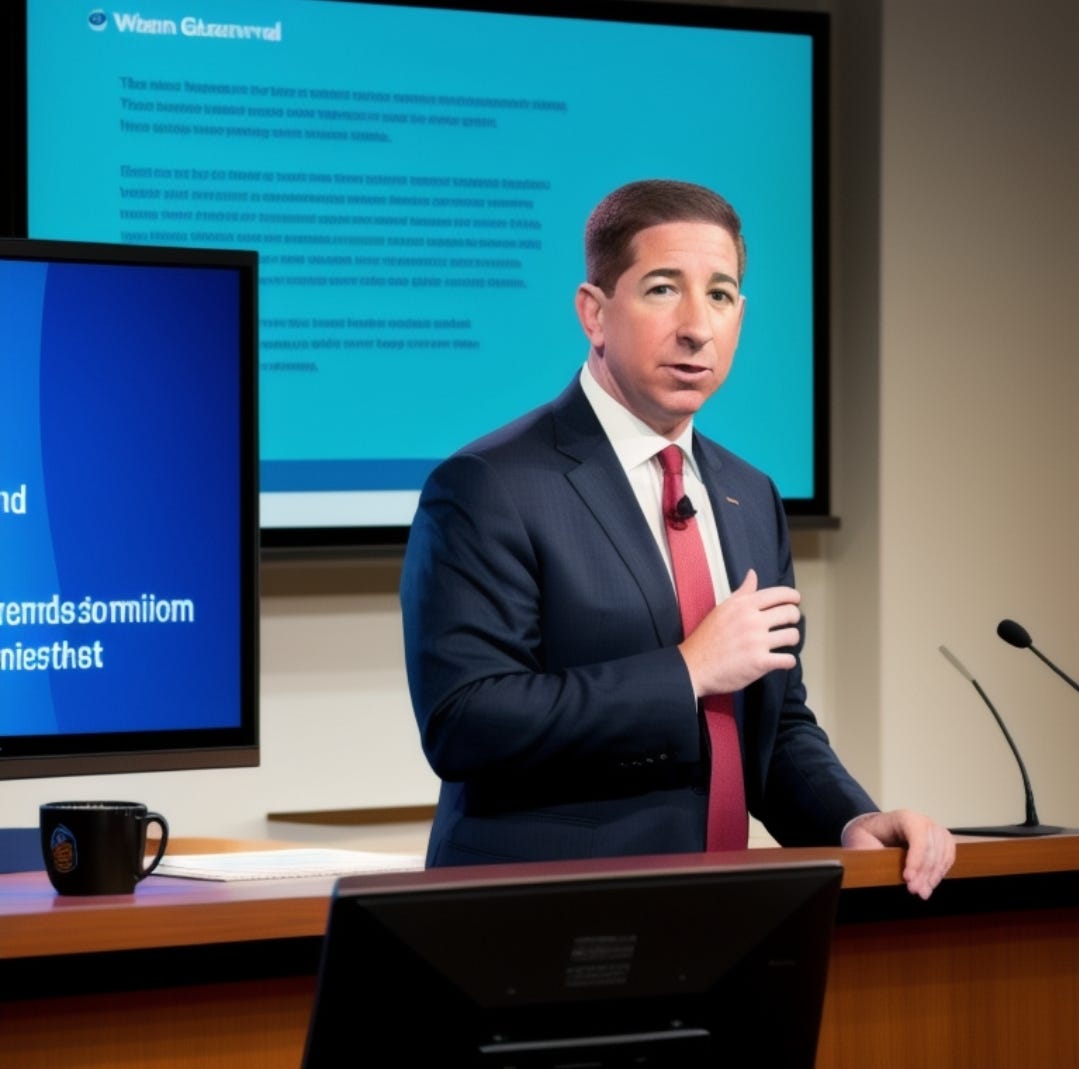“Glenn Greenwald is the American Left's most fearless political commentator… His rock-ribbed principles and absolute disregard for partisan favor have made US political discourse edgier, more confrontational, and much, much better.”
- Rachel Maddow
Time Stamps:
(0:00) Opening
(1:24) Glenn Greenwald, Dissident Journalist
(3:13) A Bald-Headed Man Tells a Bald-Faced Lie
(4:45) PRISM and Big Tech Collusion
(8:02) A Thought Criminal Serves the Public
(9:50) What Underpins the World Order
(13:18) What if it Goes Global, Pippa?
(17:57) Central Banking Digital Currency Gains Steam
(21:42) Global CBDC: The Next Creature From Jekyll Island?
Dissident journalist Glenn Greenwald cited the George W. Bush administration's secret NSA spying program for inspiring his coverage on government abuses of power. This program had been revealed by the New York Times roughly four years after the Bush administration ordered the NSA to eavesdrop on the electronic communications of American citizens without obtaining a warrant.
As Greenwald's coverage gained notoriety - now with a blog and a best-selling book under his belt - Edward Snowden eventually contacted him, recognizing Greenwald's fighting spirit and a shared concern for mass surveillance and privacy in the digital age.
The federal republic itself was created with deep concern for the protection of privacy, rooted in the protest of American colonists' protests against the ransacking at will of British officials. The Framers of our state and federal constitutions alike agreed that targeted warrants and established probable cause would serve as the rightful remedy for such abuses of power.
At the time, the post-9/11 political climate allowed the federal government to regularly trample on Fourth Amendment protections and justify practically unlimited surveillence powers in the name of national security.
But the eavesdropping program was pennies on the dollar compared to the revelations that Edward Snowden was about to expose.
A Bald-Headed Man Tells a Bald-Faced Lie
This is former Directer or National Intelligence James Clapper, lying to Congress under oath about the nature of domestic spying operations he was well aware of.
And that was the “breaking point” Edward Snowden cited that pushed him to release a massive trove of classified documents, which exposed a massive surveillance system that Americans never knew they were living under.
It took the leak of hundreds of thousands of top-secret documents to unveil the government's domestic surveillance programs.
The public dump began with Glenn Greenwald's report of Verizon following a FISA court order upon the FBI's request to turn over all contact records of their customers to the federal government. This accounted for millions of phone records on a daily basis.
There was more to come. Much more.
PRISM and Big Tech Collusion
As Greenwald relayed in his book, No Place to Hide:
"Everyone thinks this is a onetime story, a stand-alone scoop,"Snowden observed. "Nobody knows this is just the very tip of the iceberg that there's so much more to come." He turned to me. "What's next and when ?"
"PRISM," I said. "Tomorrow."
Another direct quote:
Unlike BLARNEY, FAIRVIEW, OAKSTAR, and STORMBREW, which entail tapping into fiber-optic cables and other forms of infrastructure ("upstream" surveillance, in NSA parlance), PRISM allows the NSA to collect data directly from the servers of nine of the biggest Internet companies...
PRISM is a data mining program of the NSA's collections of communications. Snowden released 41 PowerPoint slides of PRISM that identified the nine companies that participated in it. One top-secret document obtained by the Washington Post could hardly be more revealing:
Collection directly from the servers of these U.S. Service Providers: Microsoft, Yahoo, Google, Facebook, PalTalk, AOL, Skype, YouTube, Apple.
These companies that cooperated in secret were given immunity by the federal government with the Protect America Act in 2007 and the FISA Amendments Act of 2008. Prior to the Snowden dump, few politicians were aware of PRISM. Those who were had been bound by oath to keep it secret.
Various spokesmen of these companies denied even knowing about the program, and claimed their cooperation is given "only to the extent required by law."
According to government officials and the documents obtained, the identities of NSA's private partners was PRISM's most sensitive secret.
The slideshow claimed PRISM as "the most prolific contributor to the President’s Daily Brief," and Yahoo, Google, and Microsoft as the source of "98 percent of PRISM production."
“NSA reporting increasingly relies on PRISM as its leading source of raw material," it said, while also claiming it accounted for nearly one in seven intelligence reports.
This is a significant ratio, considering their annual accumulation consists of trillions of communications. Ostensibly, the purpose of the NSA was to gather foreign intelligence. Yet, this agency cast its shadow upon millions of Americans without their knowledge.
A Thought Criminal Serves the Public
For Snowden, he went from working for the government to working for the public, and releasing the information of how technology was being used against them was an act of placing it properly in their hands.
This is consistent with the theory that government derives its powers from the people, and thus, the people can take them back, especially when those powers are abused against them.
So why was it a crime?
According to the US government, Snowden was guilty of violating the notoriously abused Espionage Act of 1917 on two counts, and stealing government property.
One must doubt that a few stacks of paper or a USB drive rattled the government, so much as the material on them, that would disturb the plots to expand an ambitious spying apparatus in secrecy.
I care more about the country than what happens to me. But we can’t allow the law to become a political weapon or agree to scare people away from standing up for their rights, no matter how good the deal. I’m not going to be part of that.
A recent poll by the Cato Institute found that nearly a third of Gen Z would support the installation of government surveillance cameras in private homes.
Is this generation full of authoritarians?
Central Banking Digital Currency Gains Steam
Following the advent of privately-developed cryptocurrencies, governments around the world are asserting their interest in launching CBDCs. By now, over 100 countries are accounted, which represents 95% of global GDP.
Paul Farella, CDAA and managing director for registered investment advisor Willow, says investors can only trust CBDCs as much as they trust the government backing them.
“Through the eyes of a power-hungry state, CBDCs provide huge benefits around surveillance through the ability to track, monitor, and control all financial transactions on the CBDC’s network,” Farella says.
“This gives the government the ability to freeze or blacklist anyone using their system, and they could have complete insight into every transaction you make and know exactly how you spend your dollars and who you send them to.”
As the Biden Administration wishes to "preserve the role of physical cash, and only collect data that is strictly necessary," it also embraces the CBDC route to "expand equitable access to the financial system."
This sentiment echoes that which led to the creation of the Federal Reserve system. Instead of stating a desire for lending to be more "elastic," the buzz-phrase is "expand equitable access." In both cases, the idea is to loosen the general access, but to expand central control.
What Underpins the World Order
At the World Government Summit of 2022, economist and tech entrepreneur Pippa Malmgren declared:
We're about to abandon the traditional system of money and accounting and introduce a new one... The new accounting is what we call blockchain. It means digital [currency used in transactions]. It means having an almost perfect record of every single transaction that happens in the economy, which will give us far greater clarity over what's going on.
Pippa who?
Here's a quick profile:
Special Assistant to the President of the United States, George W. Bush, for Economic Policy on the National Economic Council.
Daughter of Harald Malmgren, a senior aide to US Presidents John F. Kennedy, Lyndon B. Johnson, Richard Nixon, and Gerald Ford.
Co-Founder of H. Robotics, a robotics and drone manufacturer.
PhD in International Relations from the London School of Economics.
Member of the Council on Foreign Relations.
"A new design, a new philosophy of data-gathering was needed" for "senior management who just want to access their data and analytics quickly and easily"
Set out "to digitize and to introduce sophisticated new AI-led and machine-learning software tools."
SHRINKFLATION
Malmgren is credited with the first usage of the term "shrinkflation" - an economic signal shown prior to its inclusion with economic data. Products are altered and sold for a similar price to ease the sticker shock process experienced by consumers.
From Merriam-Webster:
In his 2009 book Econoclasts: The Rebels Who Sparked the Supply-Side Revolution and Restored American Prosperity, Brian Domitrovic uses shrinkflation to contrast with stagflation (which is persistent inflation combined with stagnant consumer demand and relatively high unemployment). He writes, "Following World War II, the United States traded depression for an acute period of stagflation. Actually, it was 'shrinkflation,' in that the economy was contracting as prices surged." We haven't come across recent evidence of this use – it's Malmgren's use that has taken off in the past couple years.
What if it Goes Global, Pippa?
I had in mind to stress the following points in response to Pippa's case for a central bank digital currency, and its potential to morph into a globally-controlled nightmare.
The key reasons for weariness on a global fiat digital currency:
The Euro has already demonstrated the willingness of nations to forfeit their sovereignty and enter into a common monetary regime.
Over 100 countries are pursuing the idea at various stages independently. How long will it take before they consolidate, just as the EU nations did?
The entire planet already operates under the US world currency. They're fine with a world reserve currency, even if it's manipulated. But without other central banks expanding their credit, nothing seems to offset the effects of a global digital currency acting unwisely.
The Fed was pushed with a similar rhetorical approach. Banks that wish to uphold conservative lending standards are reviled. A federal cartel was advanced. The profit-loss mechanism took a back seat, and industrial access to political power and influence took shotgun.
This is one of the most absurd arguments I've ever heard about anything:
"The British government was in debt and introduced paper money to pay it off. That scenario parallels the challenges facing the U.S. and its mounting fiscal deficits, she said.
“We are doing the same thing now,” Malmgren said. In Britain, it led to the Industrial revolution. “We are the same point, with blockchain or something like it and digital money.”
Paper money is not a good parallel at all. And if this is a pitch for any "revolution," it's more fiat in the extreme.
Pippa goes on to pitch digital currency as a facilitator with "breakneck speed," a favorite go-to argument for those sympathetic with the aim.
Buckminster Fuller documented that the growth of information in 1900 was doubling every century. By 1945 it was doubling every 20 years, in 1980 annually, and in 2020 it doubles every 12 hours, she said.
It sounds like innovation develops just fine in the absense of a government spyware currency that turns such innovation against mankind and his privacy. It's bad enough being manipulated by central banksters who aren't busy tracking every dollar we spend.
But maybe we're getting to that point soon enough. With Bitcoin, as with credit and debit cards, transactions are traceable. Cashless business has emerged. It may help targeted ads, but it takes the cash option away from us.
Goldbacks are a fascinating development, but states need to adopt friendlier laws to facilitate their exchange, and more businesses need to accept them. Left as a mere hobby, they will miss out on their potential.
This part is truly a gem:
"But, according to Malmgren, “imagination is more important than analytical skills.”
“We have to understand how clients will receive information,” she said, “which may be different from how we [as advisors] view it.”
Then what's an advisor worth? Aren't you paid to put things into perspective in a way that a client will benefit from? Presumably, they come to you because you're the one with professional advice.
Global CBDC: The Next Creature From Jekyll Island?
For as unanimous as the push for CBDC appears to be, it isn't far-fetched to ponder the potential for a digital global fiat currency. After all, the creation of the Federal Reserve may have seemed far off until the revelation that a Crony Cabal of bankers in Jekyll Island finally had a plot to enact.
Again, over 100 countries are pursuing a digital currency, representing 95 percent of the world’s GDP.
Thorsten Polleit shared his thoughts in The Austrian magazine, published by the Mises Institute in an article entitled The Road to a Single Fiat World Currency.
"The decisive factor is how this single world currency comes about, and who issues it. In a free market for money—in a natural process—a single world currency would emerge from the voluntary agreements of the market participants: the money demanders would decide which commodity they want to use as money. It is impossible to predict with certainty what the outcome of the free choice of currency would be; after all, it resembles a discovery procedure whose outcome is not known in advance. However, it can be assumed that a commodity currency would be created, that gold or possibly a cryptounit would be chosen as the money base.
However, if states monopolize money production, a single world currency cannot develop through voluntary decision-making. In 2023, several national fiat currencies coexist. But this is not a stable equilibrium. Rather, here too, there is a tendency to create a single world currency—because it is optimal for everyone in the world to trade and calculate with the same currency. This is what democratic socialism takes advantage of.
Creating a single world currency is a means to an end for democratic socialism. Its adherents recognize that a single world state cannot be established directly. The national resistance that would have to be overcome is too great. The detour, the indirect way, by which democratic socialism can achieve its goal is by creating a single world currency under state control. The eurozone can serve as a “model” for this process. We’ve seen nations voluntarily give up their monetary sovereignty and accept a single fiat currency that is issued by a supranational central bank. Within the eurozone, money is no longer controlled by individual national parliaments.
External Resources:
NSA collecting phone records of millions of Verizon customers daily by Glenn Greenwald
The Most Wanted Man in the World by James Bamford
U.S., British intelligence mining data from nine U.S. Internet companies in broad secret program by Barton Gellman and Laura Poitras
CBDC: Central Bank Digital Currency by Wayne Duggan
The Road to a Single Fiat World Currency by Thorsten Polleit















Share this post